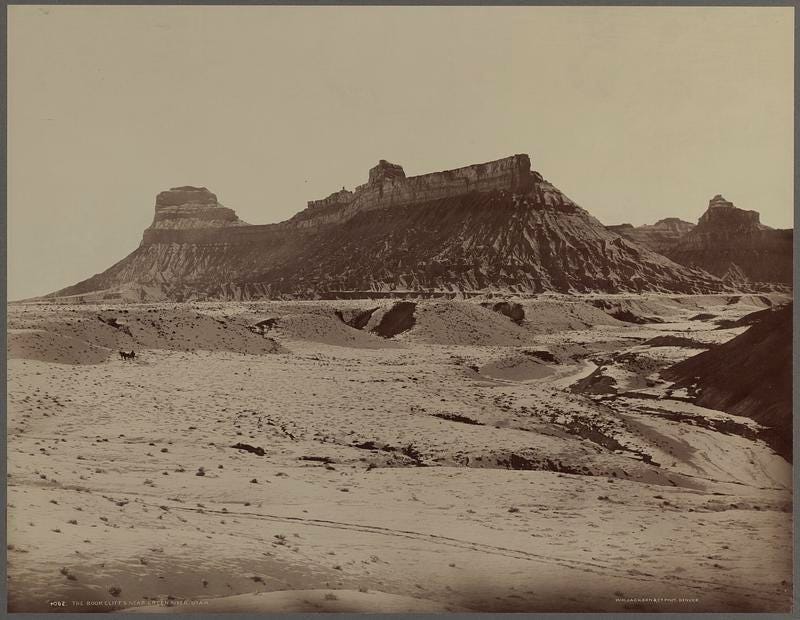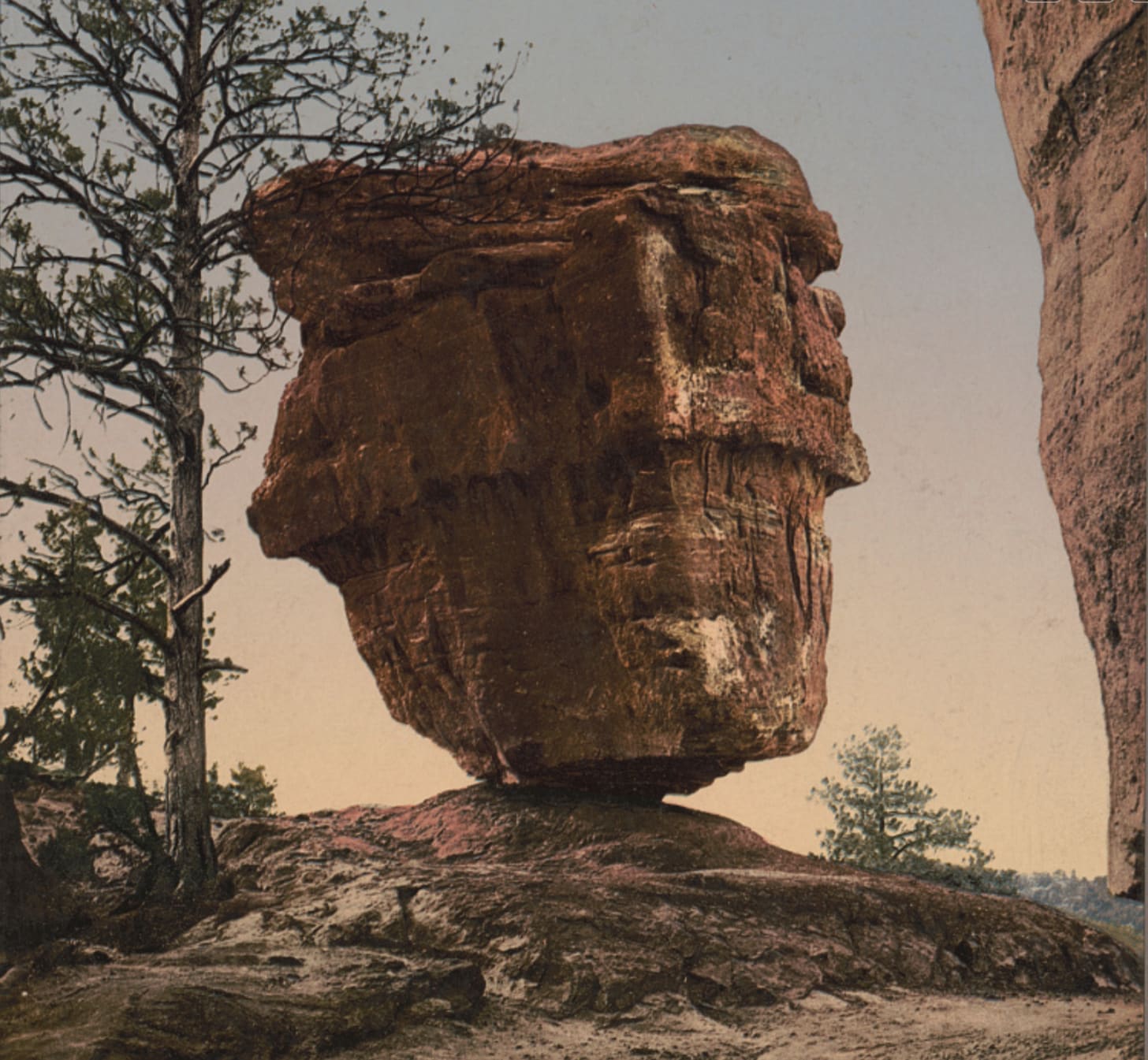the Empathy List #123: Healthy Christian Impotence
Touch rocks for perspective.
Hello friend, Liz here.
This week, the news has been abuzz with the outcomes of yearly denominational conferences, especially the PCA and SBC gathering (see this surprising coverage in the New Yorker). In addition, another abhorrent abuse scandal in another abhorrent Texas megachurch made headlines.
And paired with this ongoing conversation online, I’ve been furiously composing another Very Important Essay (I believe?) about the beginnings of white American Evangelicalism’s culture of ideological purity.1 So, I’ve been knee-deep in the records of the Moral Majority, Dallas Theological Seminary, Christianity Today, and The Gospel Coalition in order to discern exactly how these black-and-white binary thinkers managed to shift the culture of my inherited faith toward fundamentalism.
In other words, over the past two weeks, my heart and mind have been full of Christian failure. We, the White American Evangelical church, have failed to care for the vulnerable, to welcome the stranger, to include the excluded, to feed the hungry, to center the most important values espoused by Jesus. In place of these, we have uplifted ourselves—our own power, authority, and desires. And I am heart broken.
Still, I have also been reminding myself over and over that white American Christianity is not the entirety of Christianity. I do not mean “not all Christians” are like them. I do not mean to be defensive. In fact, I mean to remind you to widen your gaze. Do you know that the majority of Christians are, in fact, Catholics in non-Western nations? White American Evangelicalism does not equal the Christian church globally. (Thank GOD.) Us Protestants are outnumbered; us Westerners are outnumbered, too. So don’t be fooled by the myopia of these few pastors with large churches in these here Divided States of America. We are few, and we are not the moral majority.
~
This past week, my husband was out of town. I’d sent him on a DIY residency (the best gift I’ve ever given him, in my humble opinion), and he made collages on a farm in rural Colorado, dwarfed beneath the shadow of a rocky bluff around which the town had been built. Everywhere you went, you could locate yourself by your orientation to the bluff.
The American West is full of unknown rock monuments like these, like in Colorado Springs, where Pikes Peak provides a sense of stability and direction to those within its shadow. But flattening these natural towers into a two-dimensional photo frame does not create an accurate replica. Seeing a photo does not equate to standing beneath a tower of rock. A photo gives no sense of the presence of a peak, the way it grounds, the way it reminds a viewer of their own fragility. I am only a shadow, a blade of grass, a breath within the shadow of such a mountain.

We creatures believe ourselves to be powerful, especially in the flattened dimension of the internet. But then we step outside, and we are dwarfed by the neverending sky, by the crush of water in a riverbed, by rocks that stand thousands of feet taller than ourselves.
Feeling small is good for us humans with big heads. We need to be reminded that the Earth is not us. We exist amidst so many other monuments, creatures, and systems. And to find our place within this wider lens, we must remember our true size.
Touching rock is good for the psyche.

Considering both my own smallness and how much space American evangelicalism’s bad news has taken up in my brain, I can sometimes feel hopeless about my own ability to change things. What does it matter if I speak light and truth and kindness into this small corner of the internet when the loudest Christian voices are doubling and tripling down on hatred, exclusion, and judgment? When they are committing horrendous acts of abuse, compromise, and idolatry with a megaphone in their hands?
Yet the Christian faith is built on small acts of great love. We are a grassroots movement begun with a single (divine) person. Our founder began life as a baby, grew up in a podunk town in a colonized nation where he trained as a tradesman. Christ was blue collar and then homeless. He was called a heretic, a drunk, and a huckster. And then he was murdered by the state while his own people jeered.
So, what made his life so notable that the majority of the globe now subscribes to his religion?
He himself—in his integration of character, in his truthfulness, in his presence—changed those he encountered. And then his adherents modeled his ways to each other and their wider community. And the story and witness of their kindness spread. People traveled to tell each other this story and to model the person at the center.
The smallness of our faith is essential to its efficacy and its nature. Our smallness, too, is not a bug, but a feature. Christianity that is small and slow and genuine and poor and anti-institutional is the message and way of Christ. We do not need rules and systems and institutions to meet Jesus, we only need Him and the desire to meet Him. Consider Christ’s very ordinary interactions with those in the Gospels and how little it required of each person for Jesus to see and engage them—Zacchaeus cranes his neck while balancing in a tree, a bleeding woman touches Jesus’s robe in a crowd, a man calls out for healing on a curb, a woman draws water from a well, fishermen throw their net to the other side of the boat. Jesus seeks them there, and in their everyday experiences, he earns their trust and their worship.
Do not despise the way of small things, my friends. God is the God of the small. In fact, the smaller, more powerless, more overlooked, the better. God is the God of the humble. God despises the proud, but chooses those who have been counted out.
Even as the SBC, PCA, and other U.S. denominations continue to jockey for political power, influence, and wealth, Christ is building a kingdom out of those who have been rejected, counted out, impoverished, and named “heretics.” Ideological purity matters nothing to Jesus: to Him, what matters is purity of heart and life. All that’s required is love—God’s love for you and your openness to loving God back.
All is not lost, my friends, even when the faith seems too corrupt to save. The Spirit of God is still at work, and with humility and tenderness, we can join Her.
Thanks for reading, my friends!
Warmly, Liz Charlotte Grant
A Brief Programming Note:
Every summer, I take a break from the Empathy List, usually for a couple of months, following my elementary-aged kids’ summer vacation schedule. I do this because I am the lead parent. Also, by the time these months roll around, I am weary and out of ideas for this newsletter. Being a one-woman show, it’s important to rest so that I can sustain the disciplined practice of independent creating for the long-term. So I’ve cultivated this regular rhythm of a summer vacation to keep my enthusiasm up for this sweet community here!! I value my readers so much and want to keep giving my best.
Another benefit of this schedule for me: I have found that summer is an ideal time for me to explore new creative ideas. I often kick-off book projects during these months, and I have an idea I’m planning to chase down this summer, too. This time, I plan to blend the ideas of interdependency, ecosystems, and sustainability, exploring all three theologically and experientially in something closer to a memoir... (my favorite form, but hard to sell within the world of Christian publishing, which is a story for another time…). So it’s bound to be a joyful summer!! :-D
If you’re curious or have input on any of the above ideas, feel free to shoot me an email with thoughts and to say hi!!! I really really love to hear from readers. Really.
Thanks for your support and understanding, my friends! I’ll look forward to getting back to my regular schedule in late August/early September… though you may hear from me once or twice this summer anyway since my book preorders launch sometime in July!!!!!! [Gulp.]

For those new to the newsletter, THANK YOU for subscribing, and may I suggest eight Empathy List classics to read over this summer vacation?
Aaaand if you want to learn about the book I’m releasing THIS UPCOMING JANUARY, I’d refer you to this post…
My essay will come out in the Christian Century magazine in November—I’ll share a link when the time is right, as I’ve asked them to keep it un-paywalled for a while. ;-) By the way, have I mentioned the Christian Century? They’re one of my favorite Christian magazines to read and write for—think Harper’s for mainliners. I cannot recommend them enough!



Loved your thoughts here so much! Grateful that you have stayed faithful in the "small thing" of writing!